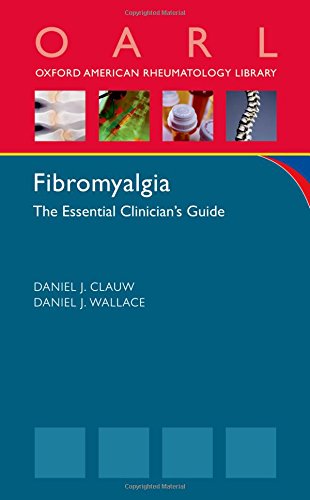Fibromyalgia (Oxford American Respiratory Library)
Fibromyalgia (Oxford American Respiratory Library)
Fibromyalgia (Oxford American Respiratory Library)
Fibromyalgia (Oxford American Respiratory Library)
Fibromyalgia (Oxford American Respiratory Library).
Characterized by chronic widespread pain, fibromyalgia presents complex problems in both its diagnosis and treatment. Fibromyalgia is a fairly common condition, affecting 2-4% of the population. The condition's prevalence has increased dramatically since 1990. The condition is not new, but has been known by various names, such as fibrositis and myofascial pain syndrome until 1990, when the American College of Rheumatology (ACR) published new classification criteria and first used the name fibromyalgia. The absence of objective diagnostic testing and the overlap with other condition often leads to a significant delay in diagnosis. There is a general misconception that the condition is unresponsive to treatment. However, published research shows that diagnosing and managing fibromyalgia leads to meaningful improvement in the patient's symptons and quality of life.Patients with fibromyalgia often demonstrate symptons additional to pain and are consquently diagnosed with one or more co-occurring syndromes and conditions, complicating diagnosis and treatment. The comorbidities most commonly associated wtih fibromyalgia are sleep disturbance, depression, anxiety, and other psychiatric disorders. Another condition frequently demonstrated by fibromylgia patients is irritable bowel syndrome. Chronic fatigue syndrome also commonly co-occurs, and is often confused wtih fibromyalgia upon initial diagnosis. Numerous pharmacological therapy options exist to treat pain and related symptons of fibromyalgia. Achievement of desired treatment outcomes requires careful patient selection, drug administration and monitoring. Accurate diagnosis of chronic pain syndromes is critical, as some commonly used medications to treat many pain conditions are relatively ineffective wtih fibromyalgia.Despite increasing recognition as a relatively common cause of chronic pain, fibromyalgia continues to generate controversy among clinicians. Given the intricate and challenging nature of treating fibromyalgia and comorbid disorders, it is imperative to educate primary care providers on the initial symptons, complications, and treatment strategies for fibromyalgia, as most patients with the condition will see a primary care provider for initial diagnosis/referral, and follow-up-care. In the years since the release of the ACR criteria, increasing recognition and advances in research have provided key insights into the etiology of fibromyalgia, resulting in the use of several successful pharmacological, as well as non-pharmacological, treatment approaches. However, despite the efforts of professional medical organizations and patient care groups, awareness of the current state of clinical assessment and treatment of fibromyalgia by healthcare professionals continues to be lacking.This book is designed to provide a succint and practical guide to help primary care physicians, internists, specialists, and allied health professionals effectively diagnose and manage patients with fibromyalgia. This concise volume will provide an essential understanding of the pathophysiology of the pain, subtypes, and pitfalls in the diagnosis of this chronic condition..
READ BOOK NOW OR DOWNLOAD BOOK NOW
Fibromyalgia (Oxford American Respiratory Library)
Millions of books have been publishedover the years and they continue to be an integral aspect of people’s livesaround the globe.
From making it easier to understand different aspects oflife to serve as worthwhile companions that take you through challenging times,books have proven to be precious commodities.
Books are essential in a variety of ways that go beyondenriching your mind or entertaining you. They have stood the test of time asreliable references for centuries. They stimulate your senses and promote goodmental health. Other benefits include enhancing your vocabulary, allowing youto travel through words, and inspiring positivity through motivationalliterature.
While the internet and television are useful in their ownways, nothing can compare to a great book. Books ignite your imagination, giveyou new ideas, challenge your perspectives, provide solutions, and sharewisdom. At every stage of your existence, you can find a relevant book thatwill add value to your personal and professional life.
Books are filled with knowledge and they teach you valuablelessons about life. They give you insight into how to navigate aspects of fear,love, challenges, and virtually every part of life. Books have been inexistence since time immemorial and they hold secrets of the past whileproviding a glimpse of the cultures of previous civilizations.
A book has the power to change or reinforce how you feelabout your surroundings. It is a therapeutic resource that can equip you withthe tools you need to stay on track and maintain a good attitude. Whether youwant to learn a new language or delve into the intrigues of nature, there is abook for every situation.
There are numerous reasons why books are important. Readingbooks is a popular hobby as people around the world rely on them for relief andentertainment. Books contain records of history and are used to spread vitalinformation. Reading books helps to improve your communication skills and learnnew things. It can be useful for easing anxiety among students andprofessionals.
Other reasons that highlight how important books are intheir positive impact on intelligence, writing abilities, and analyticalskills. Books give people a great way to escape into another dimension. Theyare packed with endless possibilities for adventure and experiences that wouldbe difficult to access in reality.
It is essential for people to strive to include books intheir daily lives aside from using them for academic or professional purposes.They aid emotional and mental growth, boost confidence, and sharpen yourmemory. It is natural for people to be curious and want to learn more, which iswhy books are still significant today.
Books are a valuable source of knowledge that affectssociety in different ways. Whether you are reading a masterpiece by anaward-winning author or narrating a bedtime story to children, the significanceof books cannot be overemphasized.
Human beings need to learn and stay informed, which arecrucial needs that books can fulfill. They are also essential for entertainmentand enable individuals to develop wholesome mindsets throughout their lives.



Comments
Post a Comment